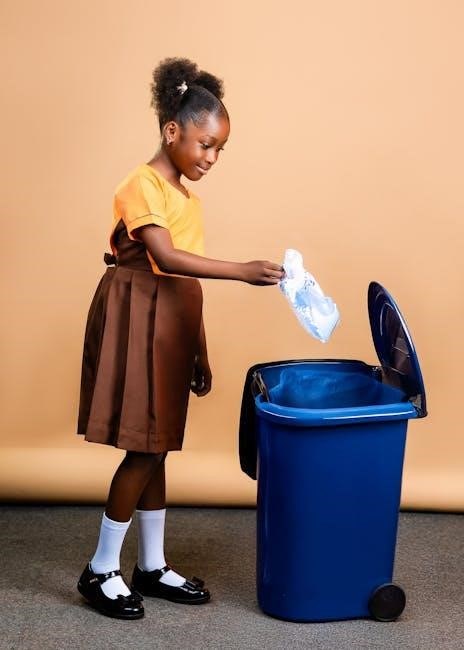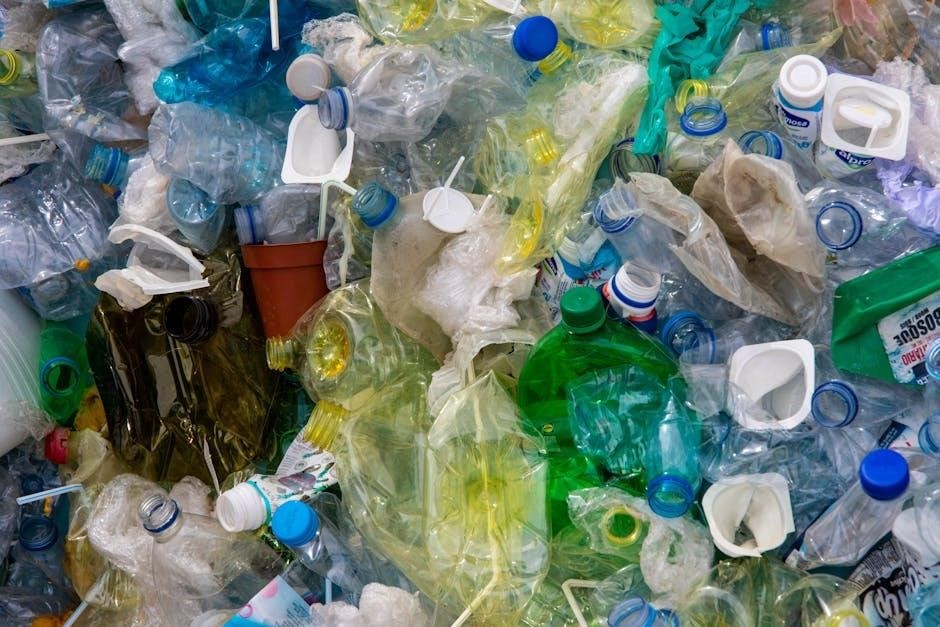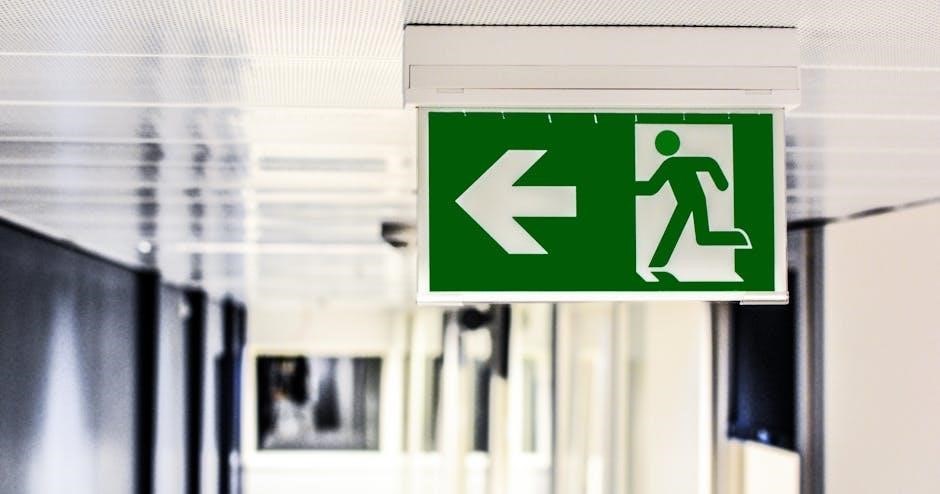The Hennepin County Recycling Guide is a comprehensive resource for residents‚ offering detailed information on recycling programs‚ drop-off facilities‚ and proper waste disposal methods. It helps residents make informed decisions about recycling‚ reducing waste‚ and contributing to sustainable practices in the community.
Overview of Recycling in Hennepin County
Hennepin County offers a robust recycling program designed to make recycling easy and accessible for all residents. The county provides a variety of resources‚ including the Green Disposal Guide‚ which helps residents determine the best ways to recycle‚ reuse‚ or dispose of household items. With two drop-off facilities in Bloomington and Brooklyn Park‚ residents can recycle electronics‚ appliances‚ and hazardous waste. The program also emphasizes organics recycling‚ encouraging residents to keep food waste and yard trim out of landfills. Additionally‚ the county has implemented multifamily recycling requirements and offers educational tools to ensure residents recycle correctly. These initiatives aim to reduce waste and promote sustainability across the community.
Importance of Recycling in Hennepin County
Recycling plays a vital role in Hennepin County’s efforts to protect the environment and promote sustainability. By reducing landfill use‚ recycling helps conserve natural resources‚ decrease greenhouse gas emissions‚ and mitigate climate change. The county’s Climate Action Plan aims to achieve net-zero emissions‚ with recycling being a key strategy. Proper recycling practices also protect public health by safely managing hazardous waste. Additionally‚ recycling supports the local economy by creating jobs in waste management and related industries. Residents’ participation in recycling programs contributes to a cleaner‚ healthier community and sets a positive example for future generations. Every effort to recycle makes a significant impact on preserving Hennepin County’s environment and natural resources.

Residential Recycling Programs
Hennepin County offers comprehensive recycling programs for residents‚ including curbside pickup‚ drop-off facilities‚ and special collection events for materials like organics and hazardous waste.
Curbside Recycling Services
Hennepin County provides curbside recycling services to single-family homes‚ offering bi-weekly collections for eligible materials. Residents can recycle paper‚ cardboard‚ glass‚ metal‚ and certain plastics. Materials must be properly sorted and placed in designated carts. Contaminated or improperly prepared items are not accepted; Schedules vary by location‚ with residents receiving calendars detailing pickup dates. Additional resources‚ such as recycling guides‚ are available online or through the county’s customer service. Residents are encouraged to check the county’s website for specific guidelines and updates to ensure compliance with program requirements. This service aims to make recycling convenient and accessible for all households.
Drop-Off Facilities in Hennepin County
Hennepin County operates several drop-off facilities to help residents recycle materials not accepted through curbside programs. These centers accept a variety of items‚ including electronics‚ batteries‚ household hazardous waste‚ and bulk items. Residents can utilize these facilities to ensure proper disposal of materials that require special handling. Locations are strategically placed across the county for convenience‚ with extended hours to accommodate different schedules; Before visiting‚ residents should check the county’s website or recycling guide to confirm accepted items and preparation requirements. This service provides an alternative for materials that cannot be recycled at home‚ promoting responsible waste management and sustainability.
Special Materials Drop-Off Days
Hennepin County hosts special drop-off days for materials that require unique handling‚ such as bulky items‚ electronics‚ and hazardous waste. These events are held periodically throughout the year at designated locations‚ providing residents with a convenient way to responsibly dispose of hard-to-recycle items. Accepted materials often include large appliances‚ tires‚ and household hazardous waste like batteries and chemicals. Residents are encouraged to check the county’s recycling guide for specific dates‚ locations‚ and item eligibility. These events help ensure that materials are processed safely and sustainably‚ reducing environmental impact and promoting community participation in waste reduction efforts. Proper preparation of items is essential for smooth processing.

Recycling Guidelines for Common Materials
Hennepin County provides clear guidelines for recycling common materials‚ emphasizing proper sorting‚ rinsing‚ and preparation. Residents are encouraged to check labels and bundle items correctly for efficient processing and to support community-wide sustainability goals.
Plastics Recycling: Types and Preparation
Hennepin County accepts plastics numbered 1‚ 2‚ and 5 for curbside recycling. These include bottles‚ jugs‚ and containers used for food or beverages. Residents should rinse items‚ remove lids or labels‚ and ensure they are empty. Plastic bags and utensils are not accepted‚ as they can clog sorting equipment. For drop-off facilities‚ check specific guidelines‚ as accepted materials may vary. Proper preparation ensures materials are efficiently processed and reduces contamination. Always verify the types of plastics accepted in your program and avoid including non-recyclable items to support effective recycling efforts.
Metal and Glass Recycling Requirements
Metal and glass items are widely accepted in Hennepin County’s recycling programs. Aluminum and steel cans‚ including soda and food cans‚ should be rinsed and flattened if possible. Glass bottles and jars are also recyclable but must be sorted by color (clear‚ brown‚ or green). Remove lids‚ labels‚ and caps‚ as these are not recyclable. Avoid including broken glass or non-recyclable metals like scrap metal or foil. Contaminated or mixed materials may not be processed. Check local guidelines for drop-off locations‚ as some facilities may accept bulk quantities. Proper preparation ensures efficient recycling and helps maintain the quality of recyclable materials.
Paper and Cardboard Recycling Tips
Paper and cardboard are essential materials in Hennepin County’s recycling programs. Residents can recycle newspapers‚ junk mail‚ cardboard boxes‚ and mixed paper‚ such as envelopes and letters. Ensure these items are clean‚ dry‚ and free of food residue. Cereal boxes and similar materials should have their shiny inner layers removed before recycling. Flatten cardboard to save space in recycling bins. Avoid mixing paper with other materials like plastic or metal. Wet or soiled paper cannot be recycled‚ so keep it separate. Properly preparing paper and cardboard helps maintain the quality of recyclables and supports efficient processing. Always check local guidelines for specific instructions.

Special Recycling Programs
Hennepin County offers diverse special recycling programs to manage unique waste types‚ including organics‚ electronics‚ batteries‚ and household hazardous waste through specialized collection methods and facilities.
Organics Recycling: Food Waste and Yard Trim
Hennepin County’s organics recycling program collects food scraps and yard trim to divert waste from landfills. Residents can participate through curbside pickup or drop-off locations. Acceptable items include fruits‚ vegetables‚ bread‚ grains‚ eggshells‚ and yard trim like leaves and branches. Materials like meat‚ dairy‚ oils‚ and plastic bags are not accepted. Participants receive compostable bags for collection. Yard trim can be shredded and reused as mulch or composted. This program reduces landfill waste and creates nutrient-rich compost. Proper preparation‚ such as removing contaminants‚ ensures successful processing. Residents are encouraged to check local guidelines for participation details and benefits.
Electronics Recycling Options
Hennepin County offers convenient electronics recycling options to responsibly manage electronic waste. Residents can recycle items like computers‚ laptops‚ tablets‚ smartphones‚ televisions‚ and printers through designated drop-off locations. The county partners with certified e-waste recyclers to ensure safe handling of hazardous materials. Many communities host collection events throughout the year‚ while others provide permanent drop-off sites. Some retailers also accept electronic devices for recycling. Before recycling‚ residents are encouraged to erase personal data from devices. A list of accepted items and locations is available on the county’s website. Recycling electronics helps conserve resources‚ reduce landfill waste‚ and protect the environment from harmful materials;
Battery and Household Hazardous Waste Disposal
Hennepin County provides designated facilities and collection events for disposing of batteries and household hazardous waste. Residents can recycle alkaline‚ nickel-cadmium‚ and lithium batteries at drop-off locations. Household hazardous waste‚ such as paint‚ chemicals‚ and fluorescent bulbs‚ must be taken to the county’s Environmental Recycling Center. Proper disposal prevents hazardous materials from contaminating landfills and waterways. Residents are encouraged to check the county’s website for locations‚ hours‚ and accepted items. Preparation guidelines‚ like taping battery terminals‚ are recommended. Safe disposal of these items supports environmental protection and community health.

Recycling Drop-Off Facilities
Hennepin County’s recycling drop-off facilities provide convenient locations for residents to recycle various materials‚ supporting sustainability and proper waste management practices countywide.
Locations and Hours of Operation
Hennepin County operates several recycling drop-off facilities‚ strategically located throughout the county. These centers are open year-round‚ with most operating five days a week. Hours typically range from 8:00 AM to 5:00 PM‚ Monday through Friday‚ though some locations may offer extended hours on weekends. Residents can visit the county’s website for a full list of locations‚ including addresses and specific hours. It’s advisable to call ahead or check online before visiting‚ as hours may vary by location and season. This ensures a smooth and efficient recycling experience for all participants.

Accepted Items at Drop-Off Facilities
Hennepin County drop-off facilities accept a variety of recyclable materials‚ including plastics‚ metals‚ glass‚ paper‚ and cardboard. Specific items like aluminum and steel cans‚ corrugated cardboard‚ and clean glass bottles are welcome. Plastics #1 and #2 are accepted‚ provided they are clean and sorted. Additionally‚ scrap metal‚ electronics‚ and organic waste are accepted at designated locations. Contaminated or mixed materials are not accepted‚ as they disrupt the recycling process. Residents are encouraged to sort items properly and rinse containers before drop-off to ensure efficient processing. For a detailed list‚ visit the county’s recycling guide or contact local facilities directly.
Fees and Limitations for Drop-Off Services
Hennepin County drop-off facilities charge fees for certain materials‚ while others are accepted at no cost. Organic waste‚ scrap metal‚ and electronics may incur fees‚ depending on the type and quantity. Residents are encouraged to check the county’s recycling guide for specific pricing. Limits apply to bulk items‚ and proof of residency may be required. Contaminated or improperly prepared materials are not accepted‚ and some hazardous waste items are restricted. Fees help cover processing and disposal costs‚ ensuring sustainable recycling practices. For detailed fee structures and limitations‚ visit the Hennepin County website or contact local facilities directly before visiting.

Recycling Ordinances and Compliance
Hennepin County enforces recycling ordinances requiring residents‚ businesses‚ and multifamily properties to separate recyclables. Proper preparation and contamination reduction are mandated. Compliance is ensured through audits and education.
2018 Multifamily Recycling Requirements
In 2018‚ Hennepin County introduced recycling mandates for multifamily properties‚ such as apartments and condos‚ to increase recycling rates. Property owners were required to provide designated recycling bins and ensure proper waste separation. The ordinance aimed to reduce landfill waste by making recycling accessible to all residents. It also mandated education for tenants on acceptable materials and proper preparation. Non-compliance could result in fines‚ emphasizing the importance of participation. This initiative aligned with broader county goals to enhance sustainability and meet waste reduction targets‚ ensuring multifamily units contribute to Hennepin County’s environmental efforts.

Proper Preparation of Recyclables
Proper preparation of recyclables is essential for efficient processing and ensuring materials are effectively repurposed. Residents must rinse food and liquid residues from containers and remove lids‚ labels‚ and caps. Metals‚ plastics‚ glass‚ and paper should be sorted and placed loosely in recycling bins—never bagged‚ as bags can jam sorting equipment. Contaminated items‚ such as greasy pizza boxes or soiled paper‚ should be disposed of as trash. Hennepin County recommends checking specific guidelines for materials like cardboard‚ which should be flattened to save space. Proper preparation helps maintain the quality of recyclables‚ reducing contamination and supporting a more effective recycling system countywide.
Consequences of Non-Compliance
Non-compliance with Hennepin County recycling guidelines can lead to significant consequences. Improperly prepared recyclables may result in materials being rejected during processing‚ potentially sending them to landfills; Contaminated items can disrupt recycling facilities‚ causing operational delays and increased costs. Residents who consistently fail to follow guidelines may receive notices or fines‚ as non-compliance can hinder the county’s ability to meet environmental goals. Additionally‚ repeated violations may lead to higher waste management costs‚ which could impact community resources. It is crucial for residents to adhere to recycling rules to maintain the efficiency and effectiveness of Hennepin County’s recycling programs and contribute to a more sustainable future.

Community Resources and Tools
Hennepin County provides comprehensive resources to support recycling efforts‚ including educational materials‚ online guides‚ and community programs designed to promote sustainable practices and waste reduction.
Hennepin County Green Disposal Guide
The Hennepin County Green Disposal Guide is a valuable resource for residents seeking environmentally responsible ways to manage waste. It provides detailed information on proper disposal methods for hazardous materials‚ electronics‚ and bulky items. The guide also includes tips on reducing waste and conserving natural resources. Residents can access the guide online or request a printed copy. It covers topics such as drop-off locations‚ acceptable items‚ and special collection events. This tool helps residents make informed decisions about waste management‚ aligning with the county’s sustainability goals. By using the Green Disposal Guide‚ residents can contribute to a healthier environment and support recycling efforts effectively.
Online Recycling Guides and Tools
Hennepin County provides a variety of online recycling guides and tools to help residents navigate waste management efficiently. The county’s official website features an interactive recycling guide that allows users to search for specific items and learn how to dispose of them properly. Additional tools include a recycling locator map‚ which helps residents find nearby drop-off facilities. Educational materials‚ such as videos and infographics‚ are also available to educate residents on best practices. These resources aim to simplify the recycling process‚ ensuring that residents can make informed decisions about waste disposal. Regular updates and new features keep the tools relevant and user-friendly for the community. By leveraging these online tools‚ residents can contribute to Hennepin County’s sustainability goals more effectively.
Workshops and Educational Programs
Hennepin County offers various workshops and educational programs to educate residents about recycling best practices. These programs are designed for residents‚ schools‚ and businesses‚ covering topics such as proper recycling techniques‚ waste reduction strategies‚ and the environmental impact of recycling. Workshops are often hosted in community centers‚ libraries‚ and schools‚ making them accessible to all. Additionally‚ online webinars and interactive sessions are available for those who prefer virtual learning. Resources like recycling guides and toolkits are provided to participants to help them implement what they’ve learned. These programs aim to foster a culture of sustainability and encourage active participation in recycling efforts countywide. Regular updates ensure the content remains relevant and effective in addressing current recycling challenges.
Challenges and Innovations in Recycling
Hennepin County faces challenges like contamination in recyclables and fluctuating market demands. Innovations include advanced sorting technologies and expanded organics recycling programs to improve efficiency and sustainability.
Contamination in Recycling Streams
Contamination in recycling streams remains a significant challenge for Hennepin County. Improper sorting of materials‚ such as non-recyclable items in recycling bins‚ leads to rejected loads and increased costs. Food residue‚ liquids‚ and plastic bags are common contaminants that disrupt processing. These issues result in recyclables being sent to landfills‚ undermining recycling efforts. Public education campaigns aim to address this by clarifying acceptable materials and proper preparation. Advanced sorting technologies are also being implemented to detect and remove contaminants more efficiently. Reducing contamination is crucial for maintaining the effectiveness and sustainability of Hennepin County’s recycling programs.
New Initiatives for Waste Reduction
Hennepin County has launched innovative initiatives to reduce waste and enhance sustainability. A key focus is expanding organics recycling‚ with increased curbside collection for food waste and yard trim. The county also promotes “zero-waste” goals through educational campaigns and partnerships with local businesses. New programs encourage residents to compost at home or participate in community garden projects. Additionally‚ Hennepin County has introduced “smart” waste bins equipped with sensors to monitor fill levels‚ optimizing collection routes and reducing emissions. These efforts aim to divert more waste from landfills and foster a culture of environmental responsibility‚ aligning with broader regional sustainability goals.
Partnerships for Improved Recycling Outcomes
Hennepin County collaborates with local businesses‚ non-profits‚ and educational institutions to enhance recycling efforts. These partnerships aim to increase recycling rates and improve program efficiency. For instance‚ the county works with private sector leaders to develop grant-funded initiatives that promote sustainable practices. Additionally‚ Hennepin County engages with schools and community organizations to educate residents about proper recycling methods. By fostering these collaborations‚ the county ensures a collective approach to waste reduction‚ leveraging shared resources and expertise. Such partnerships also encourage innovation‚ such as pilot programs for new recycling technologies. These efforts strengthen the county’s recycling infrastructure and contribute to achieving its environmental goals.

Success Stories and Community Impact
Hennepin County’s recycling initiatives have led to significant environmental benefits‚ fostering community pride and education. These efforts inspire residents to adopt sustainable practices‚ creating a lasting impact.
Case Studies of Successful Recycling Programs
Hennepin County’s organics recycling program significantly reduced food waste‚ with over 10‚000 households participating. Additionally‚ a partnership with local businesses implemented a zero-waste initiative‚ diverting 90% of waste from landfills. The county’s curbside recycling expansion increased participation by 30%‚ while educational workshops boosted proper sorting practices. These programs highlight the county’s commitment to sustainability and community engagement‚ setting a model for other regions to follow. Such successes demonstrate the tangible benefits of innovative recycling strategies and collaborative efforts.
Community Engagement and Participation
Hennepin County actively promotes community engagement through educational campaigns and outreach programs. Residents are encouraged to participate in recycling initiatives via social media‚ workshops‚ and neighborhood events. The county’s interactive tools‚ such as waste sorting guides‚ empower individuals to make informed decisions. Schools and community groups collaborate on recycling drives‚ fostering a culture of environmental responsibility. Public participation has significantly increased‚ with over 80% of households actively recycling. Community ambassadors further amplify these efforts‚ ensuring diverse populations are reached. By fostering collective action‚ Hennepin County strengthens its recycling programs and builds a more sustainable future for all residents.
Environmental Benefits of Recycling Efforts
Recycling in Hennepin County significantly reduces environmental impact by conserving natural resources‚ lowering energy consumption‚ and decreasing greenhouse gas emissions. By diverting waste from landfills‚ recycling helps mitigate climate change and reduces pollution. For example‚ recycling metals like aluminum saves 95% of the energy needed to produce new metal. Similarly‚ recycling paper saves trees‚ water‚ and reduces deforestation. Hennepin County’s efforts have diverted over 70% of waste from landfills‚ supporting cleaner air and water. These practices also protect ecosystems by reducing the need for raw material extraction. Recycling fosters a healthier environment‚ ensuring a sustainable future for generations to come while promoting resource efficiency.
